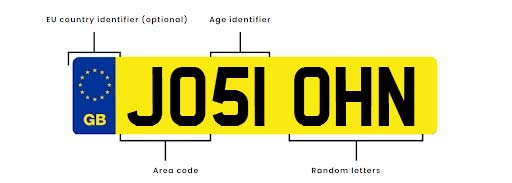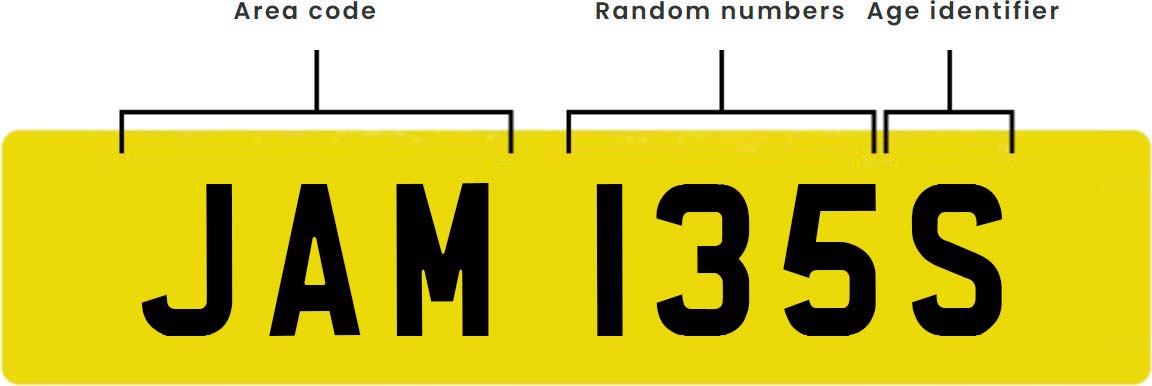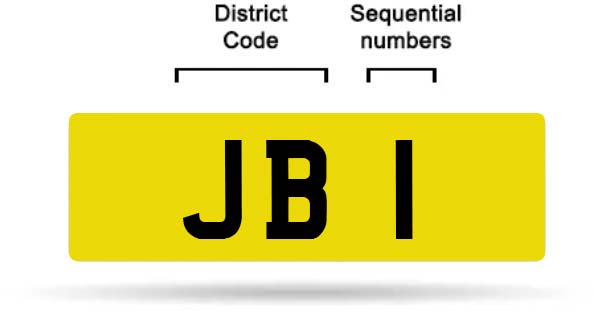Enjoy fast track transfers, full after-sales support & swift delivery!
From £175. Fast track transfer available!
Enter your initials, name, car or anything else...
Car Registration Years Chart - A Complete Guide to Number Plate Years
Looking to find out how old a car is by its registration plate? You’ve come to the right place. In this guide, we’ll show you how to find out what year a number plate is from with our list of car registration years.
Topics on this page include:
- A complete car registration years chart
- The different types of car registration years and how to identify them
- If you can put an older plate on a new car
And much more. So, keep reading to learn more about number plate years.
What Are the Different Types of Car Registration Years?
In the UK, new cars manufactured and registered are given a unique identification number, known as a registration number. This registration number gives an insight into where and when the car was registered.
However, this system has changed over the years, with four iterations of car registration and number plate styles.
They are:
- New style car registration years - the type you’re likely most familiar with as it was introduced after 2001.
- Prefix car registration years that covered the years between 1983 and 2001.
- Suffix car registration years covered the period from 1963 to 1982.
- Dateless number plate years were issued in 1903 and are slightly different from the others (but more on this later).
Below, you’ll find car registration years charts for each system and a brief explanation of how to identify them.
New Style Car Registration Age Identifier

The new car registration system, sometimes called Millenium Registrations, is the latest and currently active form of the UK’s car registration identification system. If you’re buying a newly-made car between now and 2049, you’ll buy a vehicle registered using this system.
Number plates that follow this system are split into three different sections.
- The first two letters show the area code, i.e. where the car was registered.
- The next two letters are the age identifier.
- The final three letters are random letters that allow cars registered in the same place and year to be differentiated.
However, this number plate system is issued to new cars twice a year in six-month intervals, which can impact the age identifier. Therefore it’s common to see cars registered in the same year that have different age identifiers.
These six-month periods range from the 1st of March and 31st of August to the 1st of September and the 28th/29th of February (depending on if it's a leap year).
So, a car registered on the 3rd of July 2002 would have an age identifier of 02. While a car registered on the 6th of October 2002 would have an age identifier of 52.
Check out our full guide on new-style car registration years for more information. Or, check out our new style car registration years chart below:
New Style Car Registration Years Chart
|
Age Identifier |
Registration Period |
|
51 |
1st of September 2001 to 28th/29th February 2002 |
|
02 |
1st of March 2002 to 31st of August 2002 |
|
52 |
1st of September 2002 to 28th/29th February 2003 |
|
03 |
1st of March 2003 to 31st of August 2003 |
|
53 |
1st of September 2003 to 28th/29th February 2004 |
|
04 |
1st of March 2004 to 31st of August 2004 |
|
54 |
1st of September 2004 to 28th/29th February 2005 |
|
05 |
1st of March 2005 to 31st of August 2005 |
|
55 |
1st of September 2005 to 28th/29th February 2006 |
|
06 |
1st of March 2006 to 31st of August 2006 |
|
56 |
1st of September 2006 to 28th/29th February 2007 |
|
07 |
1st of March 2007 to 31st of August 2007 |
|
57 |
1st of September 2007 to 28th/29th February 2008 |
|
08 |
1st of March 2008 to 31st of August 2008 |
|
58 |
1st of September 2008 to 28th/29th February 2009 |
|
09 |
1st of March 2009 to 31st of August 2009 |
|
59 |
1st of September 2009 to 28th/29th February 2010 |
|
10 |
1st of March 2010 to 31st of August 2010 |
|
60 |
1st of September 2010 to 28th/29th February 2011 |
|
11 |
1st of March 2011 to 31st of August 2011 |
|
61 |
1st of September 2011 to 28th/29th February 2012 |
|
12 |
1st of March 2012 to 31st of August 2012 |
|
62 |
1st of September 2012 to 28th/29th February 2013 |
|
13 |
1st of March 2013 to 31st of August 2013 |
|
63 |
1st of September 2013 to 28th/29th February 2014 |
|
14 |
1st of March 2014 to 31st of August 2014 |
|
64 |
1st of September 2014 to 28th/29th February 2015 |
|
15 |
1st of March 2015 to 31st of August 2015 |
|
65 |
1st of September 2015 to 28th/29th February 2016 |
|
16 |
1st of March 2016 to 31st of August 2016 |
|
66 |
1st of September 2016 to 28th/29th February 2017 |
|
17 |
1st of March 2017 to 31st of August 2017 |
|
67 |
1st of September 2017 to 28th/29th February 2018 |
|
18 |
1st of March 2018 to 31st of August 2018 |
|
68 |
1st of September 2018 to 28th/29th February 2019 |
|
19 |
1st of March 2019 to 31st of August 2019 |
|
69 |
1st of September 2019 to 28th/29th February 2020 |
|
20 |
1st of March 2020 to 31st of August 2020 |
|
70 |
1st of September 2020 to 28th/29th February 2021 |
|
21 |
1st of March 2021 to 31st of August 2021 |
|
71 |
1st of September 2021 to 28th/29th February 2022 |
|
22 |
1st of March 2022 to 31st of August 2022 |
|
72 |
1st of September 2022 to 28th/29th February 2023 |
|
23 |
1st of March 2023 to 31st of August 2023 |
|
73 |
1st of September 2023 to 28th/29th February 2024 |
Prefix Car Registration Years Chart

The prefix car registration system ran from 1983 to 2001. It was first introduced on August 1st 1983.
Unlike the new style registration system, prefix number plates used a letter rather than a number as an age identifier. The age identifier also appears first in the car registration, hence the name prefix.
Prefix plates are also split into three sections, but the order in which they appear is slightly different.
- The first letter is an age identifier.
- The next three letters are random numbers.
- The final three letters are the area code.
For a full guide to the prefix car registration system, click the link to view our guide. Or look below for the full prefix car registration years chart.
New Style Car Registration Years Chart
|
Prefix Letter |
Registration Period |
|
A |
From August 1983 to July 1984 |
|
B |
From August 1984 to July 1985 |
|
C |
From August 1985 to July 1986 |
|
D |
From August 1986 to July 1987 |
|
E |
From August 1987 to July 1988 |
|
F |
From August 1988 to July 1989 |
|
G |
From August 1989 to July 1990 |
|
H |
From August 1990 to July 1991 |
|
J |
From August 1991 to July 1992 |
|
K |
From August 1992 to July 1993 |
|
L |
From August 1993 to July 1994 |
|
M |
From August 1994 to July 1995 |
|
N |
From August 1995 to July 1996 |
|
P |
From August 1996 to July 1997 |
|
R |
From August 1997 to July 1998 |
|
S |
From August 1998 to February 1999 |
|
T |
From March 1999 to July 1999 |
|
V |
From August 1999 to February 2000 |
|
W |
From March 2000 to July 2000 |
|
X |
From August 2000 to February 2001 |
|
Y |
From March 2001 to July 2001 |
Suffix Car Registration Age Identifier

The Suffix car registration system was the first in the UK to provide age identifiers to number plates. It was in place from 1963 to July 1983.
Like the Prefix system, the Suffix system uses letters to represent the registration year. However, this time it appears at the end of the car registration number rather than the beginning.
- The first three letters show the area code the car was registered in.
- The next three letters are random numbers.
- And the final letter is the age identifier.
Suffix plates were registered yearly for the first four years of the system. However, from January 1967, car registrations under the Suffix system were handed out more frequently.
Check out our guide for more details about the Suffix registration system. Or keep reading to see the full Suffix car registration years chart.
Suffix Car Registration Years Chart
|
Suffix Letter |
Registration period |
|
A |
1963 |
|
B |
1964 |
|
C |
1965 |
|
D |
1966 |
|
E |
January 1967 to July 1967 |
|
F |
August 1967 to July 1968 |
|
G |
August 1968 to July 1969 |
|
H |
August 1969 to July 1970 |
|
J |
August 1970 to July 1971 |
|
K |
August 1971 to July 1972 |
|
L |
August 1972 to July 1973 |
|
M |
August 1973 to July 1974 |
|
N |
August 1974 to July 1975 |
|
P |
August 1975 to July 1976 |
|
R |
August 1976 to July 1977 |
|
S |
August 1977 to July 1978 |
|
T |
August 1978 to July 1979 |
|
V |
August 1979 to July 1980 |
|
W |
August 1980 to July 1981 |
|
X |
August 1981 to July 1982 |
|
Y |
August 1982 to July 1983 |
Dateless Car Registration Years

Although technically a car registration identification system, dateless number plates are plates that don’t have an age identifier.
These were first introduced as early as 1903 and consisted of a simple letter code and a unique number. It originally started with a single letter, then moved to two letters, then three.
Once all three-letter combinations were used, dateless number plates were reversed to include the numbers first. They don’t have an age identifier, so dateless car plates can be put on any vehicle.
Can You Put a New Plate on an Old Car?
No, you cannot put a new plate on an old car. It is illegal to make a vehicle look younger than it is.
That means you wouldn’t legally be allowed to put a private 23-number plate on a car registered in 2017.
However, you can make a car look older. So, if you had a private plate of AB55 CDE, you could put it onto any car registered after September 2005.
To learn more about number plate rules and regulations, be sure to read our full comprehensive guide by following the link.
UK Car Registration Years Conclusion
We hope you’ve enjoyed our guide to UK car registration years. UK car registrations differ by year and have undergone three major changes and systems since being introduced.
If you’re eager to find private number plates in any of the styles mentioned in this guide, be sure to check out SwiftReg. We’re a leading personalised and private number plate specialist that offers a range of fully legally compliant number plate printing services.
Be sure to click the links to start your car registration plate search.
